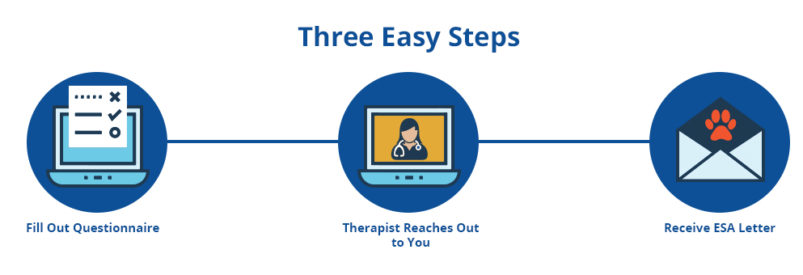Home Page › Blog › Emotional Support Dog Certification and Registration
Emotional Support Dog Certification and Registration

What is an emotional support dog?
Dogs are versatile animals: they provide love and support and can also be trained to do highly specific tasks. Because of this versatility, dogs play a big role in mental healthcare as emotional support for individuals with mental and emotional disabilities. Emotional support dogs have been shown to help individuals suffering from the following:
- Agoraphobia (the fear of public places)
- Depression
- PTSD
- Generalized Anxiety Disorder
- Social Anxiety Disorder
- Panic attacks
With the help of emotional support dogs, those suffering from the above disorders have been able to manage their condition, start recovery, and regain confidence.
How can I make my dog an emotional support dog?
- Get an ESA letter from a licensed healthcare provider
- Provide your ESA letter to your landlord
- For added comfort: Get your ESA identification card and register your Emotional Support Dog
The big picture: An ESA letter from a licensed mental health professional is the only legally acceptable way to have a recognized emotional support dog. To get one, you must have a qualifying mental health condition that is alleviated by the presence of a support dog.
What goes in an ESA letter: The letter must be signed, dated, and include the mental health professional’s license number and the date and place where their license was issued. It is important to note that the letter written by your mental health professional is typically only valid for one year for practical purposes.
Once you get the ESA letter: You start to benefit from Federal Housing laws that protect all emotional support animals, including dogs.
Benefits of certification and registration: For added convenience, many ESA owners choose to register their support dogs and carry an identification card or certificate. Other accessories like vests that visibly identify the animal as an ESA also make it easier for ESA owners to inform other tenants in their building that they have a legal assistance animal.
What rights do emotional support dogs have?
ESA legal rights: Emotional support animals are protected by both federal and state laws. Housing providers are prohibited from discriminating against tenants who need ESAs and must make reasonable accommodations.
Reasonable accommodation: It means that landlords must make an exception to a no-pets policy or a policy restricting certain dog breeds. Landlords also cannot impose size or weight restrictions on emotional support dogs. In addition, your housing provider can never charge any pet rent, fee, or deposit because you own an emotional support dog.
ESAs and the ADA: Emotional support animals do not have the same rights as service dogs (including psychiatric service dogs). ESAs are protected by the Fair Housing Act (FHA), while service dogs are under the protection of the Americans with Disabilities Act. Service dogs have been specifically trained to help perform tasks for individuals with disabilities and have the right to accompany their handlers to any place the general public can access.
Psychiatric service dogs versus emotional support dogs: Psychiatric service dogs are trained to detect and recognize the beginning of a psychiatric episode, apply deep pressure therapy, fetch medication, guard their handler, and seek or warn members of the public if necessary.
When out in public establishments, including restaurants, theaters, and stores, staff members have the right to ask two questions to verify a psychiatric service dog:
- Do you need the dog because of a disability?
- What work or tasks has the dog been trained to perform?
If an individual is unable to answer these two questions, then they do not have a service dog that meets the criteria of the Americans with Disabilities Act, and the establishment has the right to refuse to allow the animal onto their premises.
Conclusion
Emotional support dogs provide an essential service to many individuals suffering from mental health issues.
ESA owners are protected against discrimination under federal and state housing laws and enjoy other benefits like exemption from pet fees and pet breed/size restrictions.
Qualifying your pet as an emotional support animal is as simple as being assessed by a licensed healthcare professional and getting a letter that meets the requirements of the Fair Housing Act. Take the steps today to protect your animal under federal housing laws.
About the Author: The writing team at Service Dog Certifications is made up of folks who really know their stuff when it comes to disability laws and assistance animals. Many of our writers and editors have service dogs themselves and share insights from their own experiences. All of us have a passion for disability rights and animals.
Latest Posts

How to Bring a Service Dog to Disneyland
Trained service dogs are more than welcome to join their handlers at Disneyland. In this guide, we’ll explain Disneyland’s policies and give practical advice for bringing a service dog to Disneyland for the first time. Disneyland’s Service Dog Policies The Magic Kingdom is happy to welcome trained service dogs across most park locations! They kindly […]

Read More

Can Dogs Eat Tomatoes?
Yes! Dogs can safely enjoy tomatoes, but there are a few risks to be aware of so you can feed your dog responsibly. Fully ripe tomatoes (without the stems and leaves) can actually have nutrients that are good for your pup. Tomatoes have chlorogenic acid, an antioxidant that can have anti-inflammatory effects in cells. They’re […]

Read More

Can a Primary Care Doctor Write an ESA Letter?
Your family doctor, also called a primary care physician (PCP), can write a letter recommending an emotional support animal. We’ll explain what legally gives them that ability and explore what better options might be available for you. Why are Physicians Able to Write an ESA Letter? To turn your pet into an emotional support animal, […]

Read More









To whom it may concern,
My ESA dog and my girlfriends ESA cat are newly moved to Orange County and we are dealing with a very hostile apartment manager who is threatening that they will be evicted unless we supply a license by tomorrow. Mind you, we are not denying the license nor giving a hard time but we have been having difficulty with covid and getting an appointment. My question is if our ESA animals are required to even attain a license even though we have already supplied the ESA documents showing a letter from a proper licensed medical healthcare provider?
You do not need a license for an emotional support animal, there is no such thing as an official “license” for ESAs. The only documentation you need is a letter from a licensed healthcare professional.
How much to get 2 Certificates my daughter has two labs for depression and emotional support and her landlords are giving her a hard time now she’s had them for a shoot since 2012 inches first time we’ve ever had any issues
If your daughter has emotional support animals she will need a signed ESA letter from a licensed healthcare professional. You can also obtain a certificate later, but that is completely optional. Please see this article for more information: https://www.servicedogcertifications.org/how-to-get-an-emotional-support-dog-letter/
Now that the FDA and DOT will be changing their rules and resclasify an ESA as a pet, where do we go from here? I can’t afford to have my dog trained as a therapy dog. This will change the rules for everything. Fair housing. Buses trains. How do I certify my dog fir travel? I think this is illegal and inhumane for those of us with mental health issues.
Yes, these are truly great concerns. But don’t fully give up hope just yet. We will see in January how the new rules play out when the different airlines release their new guides on traveling with assistance animals. Turning an ESA into a service dog isn’t feasible for many, but some ESA owners may be able to train their dog to become a service dog if they have a need for a task trained animal to assist with their disability. You may find this article on the DOT’s new rules helpful: https://www.servicedogcertifications.org/flying-with-a-service-dog-guide/
How long is this process?
Does a landlord have the right to ask the tenant to not leave their ESD home alone for long periods of time?